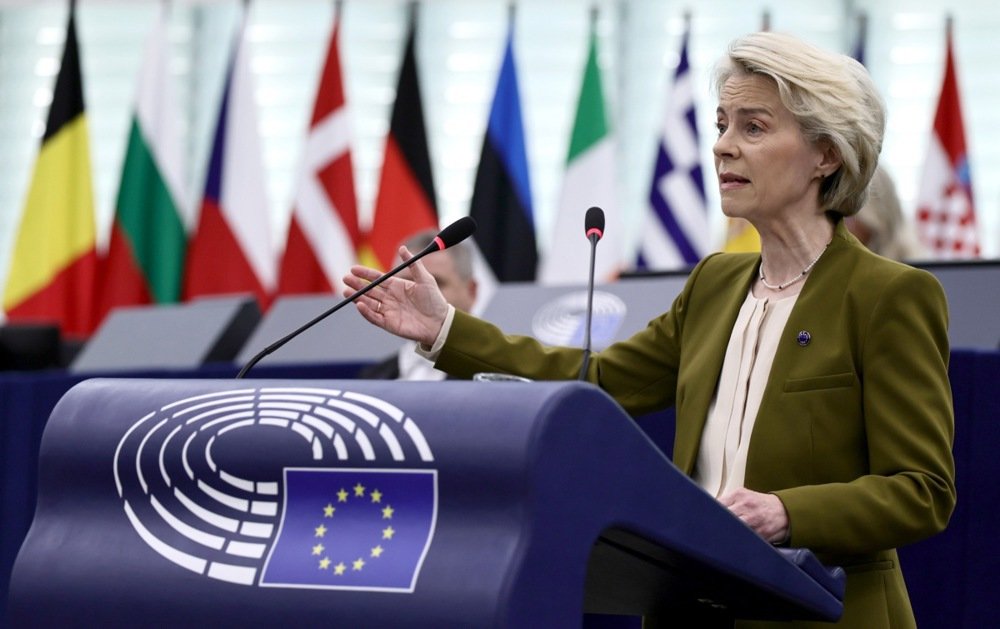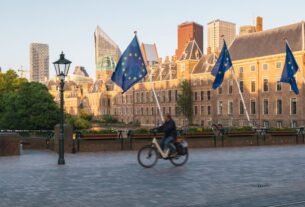—————————————————————————————————————
“Europe’s Independence Moment”. That was the European Commission’s tagline for Ursula von der Leyen’s annual address on the state of the European Union.
Hours before, Russia carried out its biggest breach yet of EU & NATO airspace. A moment of violation in which for the first time Polish and Dutch planes shot down Russian drones over Polish territory.
Crisis averted, for now. But it served as yet another reminder of our blindness around Russia’s activities at our eastern border.
For German Defence Minister Boris Pistorius, there is no uncertainty.
“These drones were clearly deliberately set on this course,” he said on Wednesday. “We are facing a constant threat from provocations by Russian forces in Baltic airspace”, he added.
But EU members are not singing from the same hymn sheet.
Slovak Prime Minister Robert Fico stayed on the fence. It’s “vitally important to establish …under whose control the used drones were”.
And no, it’s not only Putin’s friends who are more circumspect. In a bid to prevent World War Three, NATO Sec-Gen Mark Rutte also demurred from saying the incursion was intentional. Pending the result of a NATO investigation, he has settled on labelling it “reckless and dangerous”.
The simple fact we cannot say clearly and quickly if we have been attacked, invaded, or otherwise aggressed is a true sign of weakness.
Nor is this a one-off.
The talk of the EU bubble last week was the incorrect reporting that Russia had targeted von der Leyen’s aeroplane as she toured the EU’s eastern flank.
The episode featured conflicting statements from the Bulgarian authorities, Commission imprecision, and seemingly false – though uncorrected – reporting from one of the world’s most respected newspapers.
These incidents are dangerous, because where information is poor or confused, misunderstandings and false flag operations become possible. Look at 1931 Manchuria, Poland in 1939, and Crimea in 2014 if you’re not convinced.
Thankfully, our blindness is easily fixed, if Europe mobilises around two particular sentences of von der Leyen’s speech:
-
- “We must invest in real-time space surveillance so that no movement of forces goes unnoticed.”
- “We must heed the call of our Baltic friends and build this wall of drones.”
In light of last night’s events, these aren’t empty invocations; they are imperatives we should have answered long ago. To do otherwise would be negligence of the highest order – one that won’t only endanger our Baltic friends, but the bloc at large.
Roundup
Partial suspension on EU-Israel trade deal – Proposed by Ursula von der Leyen at the SOTEU, the measure would be the strongest yet against Israel.
Russian drone threat prompts Article 4 – Poland started the consultation process after Russian drones invaded the country’s airspace overnight.
Mysterious new EU health plan prompts questions – Ursula von der Leyen proposed a “Global Health Resilience Initiative” in response to a medical misinformation crisis. But much is unknown beyond the name.
Across Europe
Baltics bracing for budget cuts – The three countries are awaiting a Congress decision after the Trump administration proposed the loss of some funds.
Austrian sustainability case rejected – EU’s General Court decided to uphold the EC’s decision to classify nuclear and gas energy as sustainable.
Iran agrees on deal regarding nuclear facilities – The cooperation deal with the International Atomic Energy Agency includes all facilities, though Iran said the agreement itself “does not create access.”




